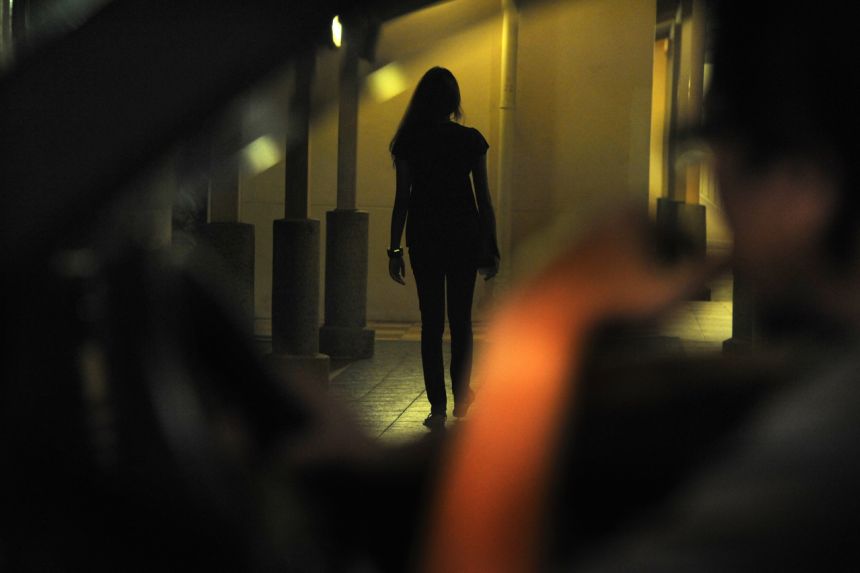South Korea to impose stiffer penalties for stalking
Sign up now: Get insights on Asia's fast-moving developments

Under the new law, stalkers can be fined up to 30 million won (S$35,000) or jailed for up to three years.
PHOTO ILLUSTRATION: JEREMY LONG HM
Follow topic:
SEOUL - For two years, South Korean actress-singer Bae Da-hae was harassed by a fan-turned-stalker.
He followed her around and posted more than 100 malicious comments about her online using 24 different accounts, after she did not respond to the 800 messages that he had sent her, professing his love for her.
When she ignored his gift of a pet hamster, he sent her a picture of a cat eating a hamster instead.
Last November, she revealed that she was suing the man for attempted blackmail and defamation, among other things.
"After enduring the stalker's malicious comments like a fool for such a long time, I have finally collected enough evidence and completed the proceedings for a lawsuit," Ms Bae, 37, said in a post on Instagram.
"I realised that even though we reported the case to the police and filed for a personal protection order, there was no action taken against the stalker. There were so many times I felt so much despair that I thought the pain would end only if I die."
The man, aged 29, was arrested last December on charges including intimidation, defamation and blackmail, and sentenced to two years in jail in March.
The court had ruled that "stalking is a serious crime that destroys a person's personality and daily life" and "punishment must commensurate with the pain the victim suffered".
Until recently though, stalking is viewed as a minor misdemeanour in South Korea.
Out of the 4,515 stalking cases reported to the police last year, 89.2 per cent were closed without any action taken, according to data released recently.
Only 488 offenders were punished under the Minor Offences Act, with penalties such as a maximum fine of 100,000 won (S$118) or up to 29 days in jail. Most of them were fined an average of 94,000 won.
Activists have been calling for harsher penalties against stalking, blaming an increase in cases on mild punishment. Back in 2013, the police handled only 312 stalking cases.
Ms Bae's stalker, for one, continued to taunt her during police investigations, posting on social media that "this will end with just a fine".
Only in March this year did lawmakers unanimously pass a stricter law against stalkers - 22 years after it was first raised.
Under the new law that will go into effect on Oct 21, stalkers can be fined up to 30 million won or jailed for up to three years. If the culprit is found to have carried a weapon, the maximum penalty increases to 50 million won for a fine and five years in jail.
The new law defines stalking as a crime if it includes repeatedly approaching, following or blocking someone against his or her will, waiting/observing a victim around his or her home, workplace or school, and causing anxiety or fear by sending the victim text messages or videos.
It will also allow the police to issue restraining orders that ban the stalker from going near the victim and block any online contact between them.
Experts said more needs to be done to raise public awareness about stalking being a crime and to prevent stalking.
Psychiatry professor Yoon Dae-hyun of Seoul National University Hospital said victims of stalking often suffer immense mental stress, but "legal punishment is limited" if there is no physical threat. As such, punishment is often meted out only "after an incident occurs", Prof Yoon told Chosun Ilbo newspaper.
But it can be too late - as in the case of a triple murder that shook the nation weeks ago.
Kim Tae-hyeon, 25, met a woman through an online game last December and started stalking her after she refused to meet him in person.
In March, he stole a knife and posed as a deliveryman to gain entry into her house. He stabbed her sister who opened the door, and then attacked her mother and her when they came home. He was found lying unconscious with his three victims, all dead, two days later.
Kim told the police that he got angry with the woman and decided to kill her because she changed her phone number and avoided contact with him.
He has been indicted for murder.
The case has got many women thinking about how to protect themselves against unwanted male attention.
Office worker Lee Hyun-a, 26, is thinking about learning self-defence skills.
"I can get a restraining order against stalkers, but the police cannot protect me 24 hours," she told The Straits Times. "I must always be careful because crime occurs in the most unpredictable situations."
Ms Park Ji-eun, 29, recalled how a friend got stalked before but it stopped after she reported it to the police.
"Still, she said it was a scary experience," said Ms Park, who works in a marketing company.
"Stalking is not just a crime, it is an act that invades a person's life and can potentially lead to murder. I don't carry any protective gear with me, but if I meet a stalker, I will report him to the police and get a restraining order."

